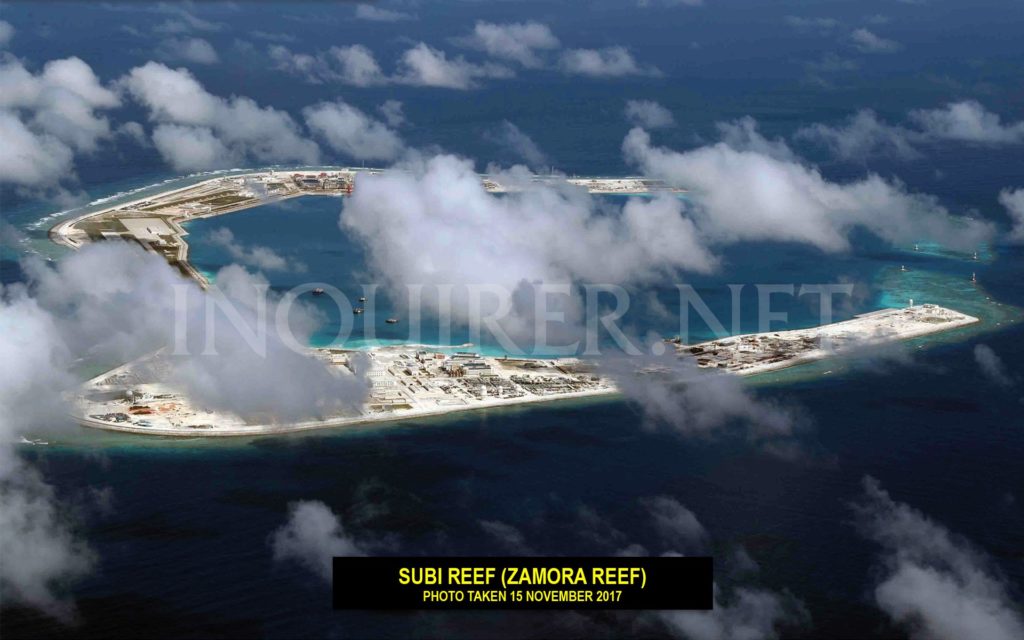Carpio: Kowtowing to Beijing is wrong

RUNWAY ON ZAMORA REEF Stepping up its militarization of the South China Sea, Beijing has built a 3.1-kilometer runway on Zamora Reef in the Spratly archipelago. Similar runways have also been constructed on two other artificial islands.
Acquiescence to China’s militarization of artificial islands in the Spratly archipelago will put to waste the Philippines’ fight for its sovereign rights in the West Philippine Sea, Supreme Court Senior Associate Justice Antonio Carpio said on Monday.
Malacañang, however, insisted it could do nothing, and blamed the Aquino administration for China’s aggressive actions in the South China Sea.
“A policy of appeasement by the Philippines will only embolden China to further militarize its artificial islands in the Spratlys,” Carpio said, commenting on an Inquirer.net exclusive report on China’s construction of naval and air bases on seven reefs in the middle of the heavily disputed waterway.
Seven reefs
Aerial photographs that accompanied the report showed runways, military facilities and weapons on Kagitingan Reef, known internationally as Fiery Cross Reef; Calderon (Cuarteron), Burgos (Gaven), Mabini (Johnson South), Panganiban (Mischief), Zamora (Subi) and McKennan (Hughes) reefs.
“Any statement from the Philippines that it cannot stop China from militarizing its artificial islands, or from undertaking new reclamations, is actually telling China to proceed because the Philippines will not stand in the way,” said Carpio, a member of the legal team that argued the Philippines’ challenge to China’s claim to almost all of the South China Sea in the Permanent Court of Arbitration in The Hague.
The UN-backed tribunal found for the Philippines and declared China’s sweeping claim invalid, as it had no basis on international law.
The arbitral court also declared Beijing had violated Manila’s sovereign rights to fish and explore for minerals in the West Philippine Sea, waters within the Philippines’ 370-kilometer exclusive economic zone (EEZ) in the South China Sea.
But President Rodrigo Duterte, who came to power shortly before the ruling came down, refused to assert the Philippine victory, wooing China instead for loans and investments.
Roque blames Aquino
Commenting on the Inquirer.net report on Monday, presidential spokesperson Harry Roque blamed China’s construction and militarization of artificial islands in the Spratlys on the Aquino administration, which had brought and won the arbitration case.
“Our position is everything found on these islands [was] already there when the President took over,” Roque told reporters.
“This militarization, if you can call it militarization, did not happen during the Duterte administration alone. It’s been long militarized and the question is: What can we do? What did the past administration do, and what can we do?”
Roque noted that Mr. Duterte was able to “extract” a promise from China not to build new artificial islands, particularly on Panatag Shoal, a rich fishing ground just 230 km west of Zambales province.
“So what do you want us to say? All that we could do is extract a promise from China not to reclaim any new artificial islands,” he said.
“If the Aquino administration was not able to do anything about these artificial islands, what [do] they want us to do?” he said.
“We cannot declare war. Not only is it illegal but it is also contrary . . . because it’s impossible for us to declare war at this point,” he added.
No need to go to war
In a speech on the first anniversary of the arbitral ruling on July 12 last year, Carpio said the Philippines did not need to go to war to assert its victory over China.
The real and practical option for the Philippines is to “talk with China while taking measures to fortify the arbitral ruling,” Carpio said.
“We should talk with China on the [proposed code of conduct in the South China Sea], on the Code for Unplanned Encounters at Sea for naval and coast guard vessels, on conservation of fish stocks, on preservation of the maritime environment, and on how our fishermen can fish in [Panatag] Shoal. There are many other things to talk with China on the South China Sea dispute even if China refuses to discuss the arbitral ruling,” he said.
And while talking with China, Carpio said, the Philippines can fortify the arbitral ruling by entering into maritime boundary agreements with Vietnam and Malaysia that will partially enforce the arbitral ruling.
At least protest
On Monday, Carpio said the Philippines would only fail to secure the support of other nations if it would continue to kowtow to China.
“At the very least the Philippines should protest, and keep on protesting, to preserve its sovereignty and sovereign rights,” he said.
“Otherwise, if the Philippines remains silent, it may be deemed under international law to have waived or abandoned its sovereignty or sovereign rights,” he added.
In the Inquirer.net report, Carpio warned that the Philippines could lose 80 percent of its EEZ and 40 percent of its fishing grounds if it allowed China to dominate the West Philippine Sea.
Roque said Carpio’s warning appeared to be speculative.
Carpio also slammed Roque’s position of relying on China’s good faith, likening it to trusting a thief.
Responding, Roque said Carpio should run for Congress if he wanted to craft public policy for the government.
RELATED VIDEO
For comprehensive coverage, in-depth analysis, visit our special page for West Philippine Sea updates. Stay informed with articles, videos, and expert opinions.